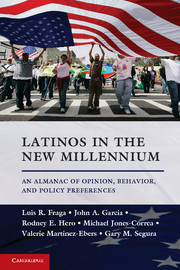Book contents
- Frontmatter
- Contents
- Acknowledgments
- 1 Latinos in the New Millennium
- 2 A Demographic Profile of Latinos in the United States
- 3 Core Values
- 4 Latino Identities
- 5 Latino Transnationalism
- 6 Intergroup Relations
- 7 Civic Engagement
- 8 Latino Media and Technology Usage
- 9 Voter Registration, Turnout, and Choice
- 10 Evolving Patterns and Preferences in Latino Partisanship
- 11 Latinos and Gender Role Attitudes
- 12 Latino Issues and Policy Preferences
- 13 Hope and Reality in Latino Educational Attainment
- 14 Latinos and the Future of American Politics
- Index
- References
3 - Core Values
Beliefs and the “American Creed”
Published online by Cambridge University Press: 05 June 2012
- Frontmatter
- Contents
- Acknowledgments
- 1 Latinos in the New Millennium
- 2 A Demographic Profile of Latinos in the United States
- 3 Core Values
- 4 Latino Identities
- 5 Latino Transnationalism
- 6 Intergroup Relations
- 7 Civic Engagement
- 8 Latino Media and Technology Usage
- 9 Voter Registration, Turnout, and Choice
- 10 Evolving Patterns and Preferences in Latino Partisanship
- 11 Latinos and Gender Role Attitudes
- 12 Latino Issues and Policy Preferences
- 13 Hope and Reality in Latino Educational Attainment
- 14 Latinos and the Future of American Politics
- Index
- References
Summary
Few issues regarding Latinos, particularly Latino immigrants, have been as normatively controversial as perceptions and assessments of the extent to which they hold and embrace core American beliefs and values. But identifying, and measuring, “core” values and beliefs in American politics has never been a simple task in the first place. Both the media and the political realm offer frequent assertions about the existence of an “American Creed,” but there is some debate about what the specific elements of such a creed might be and the importance of each of the values that might constitute that creed, both in its own right and relative to others (see Fraga and Segura 2006). Ideas such as democracy, liberty, equality (of opportunity), and individual achievement (self-reliance) are all considered part of the American creed (Citrin et al. 1990). However, scholars suggest that values, such as equality and the potential need for a firm equality of condition, are pivotal. Moreover, numerous scholars have claimed there is no single tradition but multiple political traditions in American politics (Smith 1993), the existence of which belie the assertion of a singular American creed.
Of these multiple traditions it is the liberal tradition that is generally considered the most prominent. This is, the tradition that stresses freedom, liberty, individualism, and equality of opportunity as the defining elements of American political thought. Individualism is often associated with (strong) beliefs in self-reliance, hard work, and taking responsibility for one's own economic and social situation. There is also a corollary assumption that equality of opportunity is inherently important and an essential structural feature linked to individual beliefs about self-reliance and hard work. Also influential is the civic republican tradition that promotes civic engagement, community, and fraternity as essential traits of American society. We discuss civic engagement in Chapter 7, but readers will find aspects of community integrated into topics throughout the book. A third tradition, ascriptive hierarchy, focuses on traits such as race-ethnicity, gender, and class,which have served as ostensible justifications for exclusion and/or an unequal status by those who would argue that some individuals and groups are less (or more) deserving or worthy of a legitimate place in the American polity (Smith 1993; see Elazar 1966). We chose to focus our survey questions on issues associated with individualism, self-reliance, and equality of opportunity that are most closely associated with the liberal tradition because of that tradition's ostensible primacy among American political values, and because Latinos’ beliefs in such values has often been an implicit and sometimes explicit basis on which Latinos are “evaluated” by the larger society.
- Type
- Chapter
- Information
- Latinos in the New MillenniumAn Almanac of Opinion, Behavior, and Policy Preferences, pp. 56 - 75Publisher: Cambridge University PressPrint publication year: 2011

